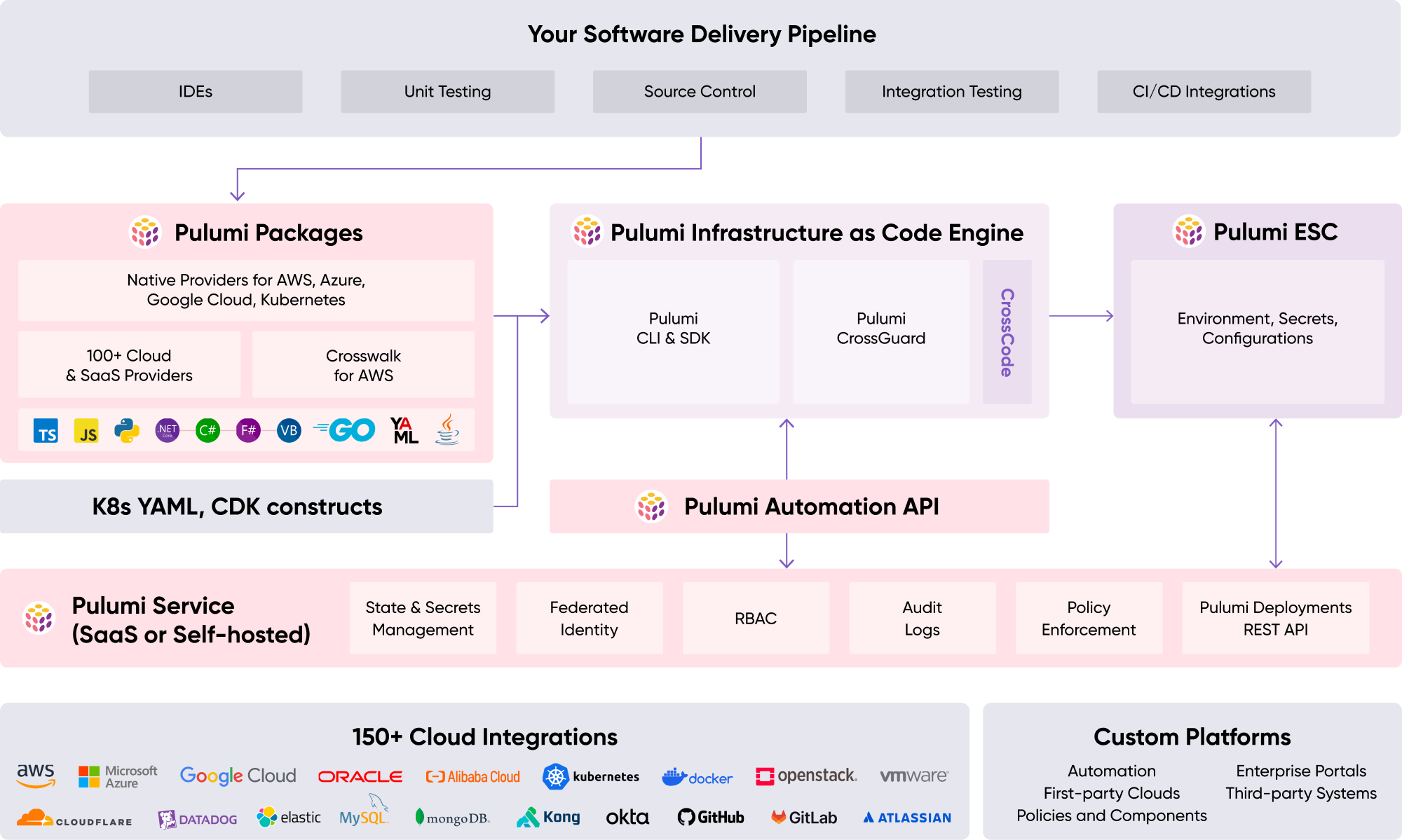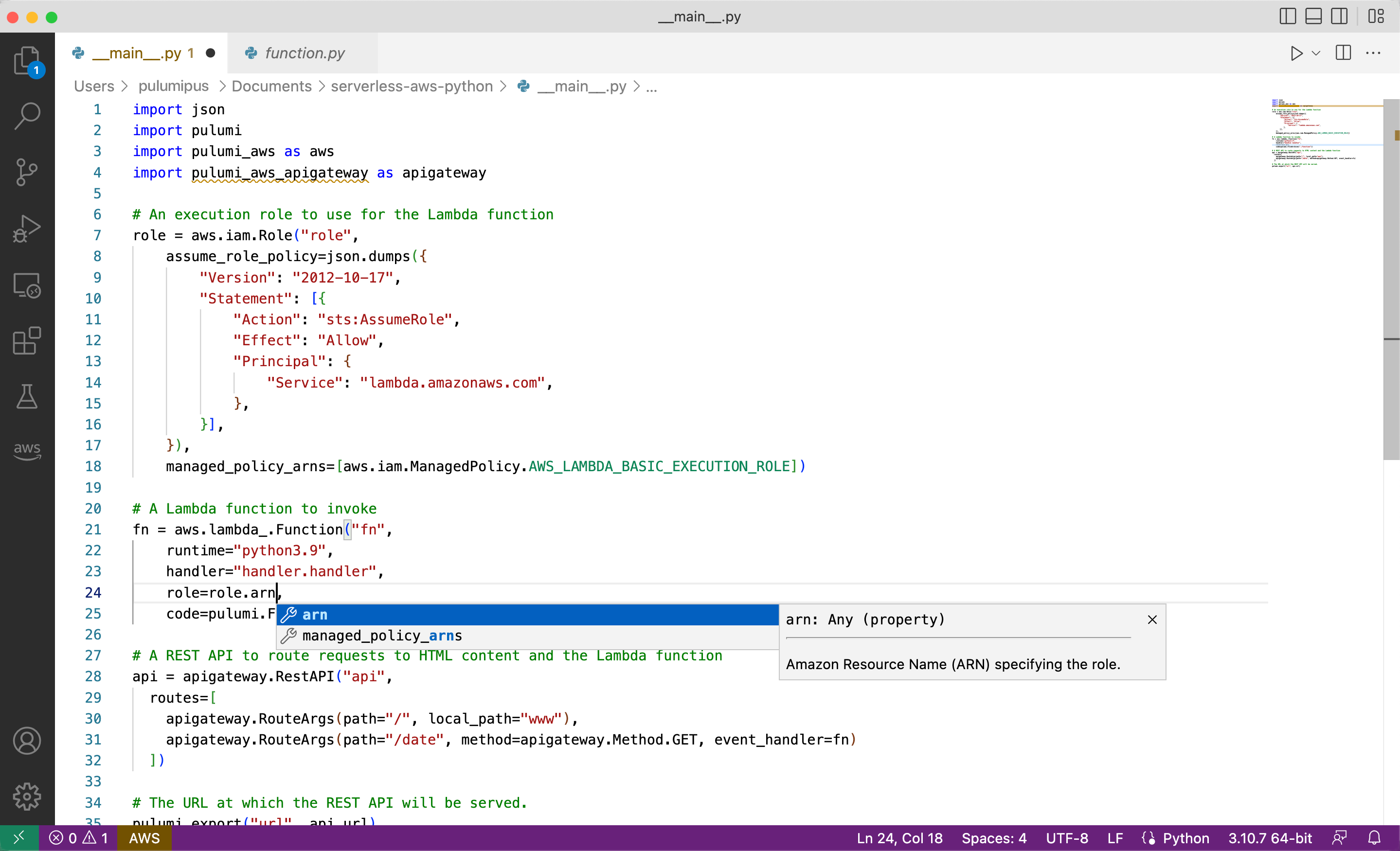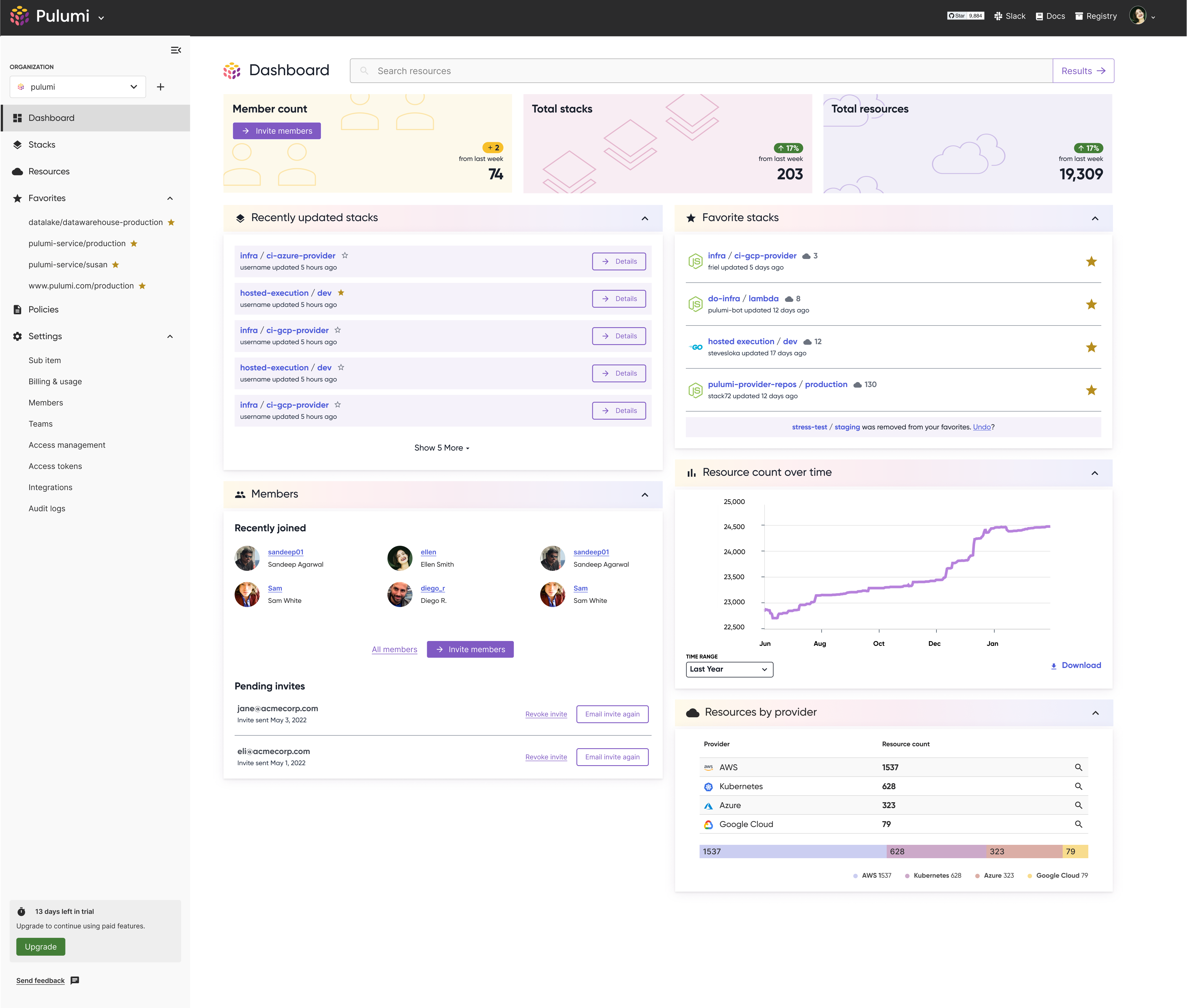Infrastructure as Code
in any Programming Language
Build and ship infrastructure faster using languages you know and love. Use Pulumi’s open source SDK to provision infrastructure on any cloud, and securely and collaboratively build and manage infrastructure using Pulumi Cloud.

Author in any language, deploy to any cloud
Pulumi Infrastructure as Code Engine
Define infrastructure as code (IaC) in TypeScript/JavaScript, Python, Go, C#, Java, and YAML using your IDE and test frameworks for a fast inner dev loop. Deploy to 150+ providers like AWS, Azure, Google Cloud, and Kubernetes.

Code faster
Write infrastructure code in languages you love using your IDE and any language ecosystem tool.
Generate code with AI
Ask Pulumi AI to create your desired infrastructure code with natural language prompts.
Write Policy as Code
Write Policy as Code in programming languages to enforce best practices with CrossGuard.
One source of truth for your Secrets and Configuration

Pulumi ESC: Environments, Secrets and Configuration
Centralized environments, secrets, and configuration management for cloud applications and infrastructure. Define environments as collections of configuration and secrets, which can be pulled from any source and locked down with RBAC, versioning and audit controls.
Frictionless Security
Easy-to-use single source of truth for all configuration and secrets with guardrails. Seamlessly adopt short-lived dynamic secrets.
Improve Developer Efficiency
Never have downtime over changed configuration. Change once and have it updated everywhere.
Control Access and Compliance
Enforce least-privileged access through role-based access controls. All changes are fully logged for auditing.
Create infrastructure automation workflows
Pulumi Automation API
Create workflows that coordinate provisioning, previewing, refreshing, and destroying cloud resources by using the Pulumi engine as a library in your application code.

10x productivity
Engineers can manage 10x more cloud resources using Automation API compared to traditional CLI tools.
Create custom CLIs
Build atop Pulumi to create CLIs that make it easy for end-users to provision prebuilt cloud architectures.
Power up your SaaS
Enable your services and APIs to dynamically provision and manage cloud resources at scale.
Build infrastructure faster with reusable components
Pulumi Packages
Build and reuse higher-level abstractions for cloud architectures with multi-language Pulumi Packages. Distribute the packages through repositories or package managers so your team members can reuse them.
import * as eks from "@pulumi/eks";
// Create an EKS cluster with the default configuration.
const cluster = new eks.Cluster("eks-cluster");
// Export the cluster's kubeconfig.
export const kubeconfig = cluster.kubeconfig;
import pulumi
import pulumi_eks as eks
# Create an EKS cluster with the default configuration.
cluster = eks.Cluster("eks-cluster")
# Export the cluster's kubeconfig.
pulumi.export("kubeconfig", cluster.kubeconfig)
package main
import (
"github.com/pulumi/pulumi-eks/sdk/go/eks"
"github.com/pulumi/pulumi/sdk/v3/go/pulumi"
)
func main() {
pulumi.Run(func(ctx *pulumi.Context) error {
// Create an EKS cluster with default settings.
cluster, err := eks.NewCluster(ctx, "eks-cluster", nil)
if err != nil {
return err
}
// Export the cluster's kubeconfig.
ctx.Export("kubeconfig", cluster.Kubeconfig)
return nil
})
}
using System.Collections.Generic;
using Pulumi;
using Pulumi.Eks;
await Deployment.RunAsync(() =>
{
// Create an EKS cluster with default settings.
var cluster = new Cluster("eks-cluster");
// Export the cluster's kubeconfig.
return new Dictionary<string, object?>
{
["kubeconfig"] = cluster.Kubeconfig
};
});
import com.pulumi.Context;
import com.pulumi.Pulumi;
import com.pulumi.eks.Cluster;
public class App {
public static void main(String[] args) {
Pulumi.run(App::stack);
}
private static void stack(Context ctx) {
final var cluster = new Cluster("eks-cluster");
ctx.export("kubeconfig", cluster.kubeconfig());
}
}
resources:
eks-cluster:
type: eks:Cluster
outputs:
kubeconfig: ${cluster.kubeconfig}
Native cloud providers
Full API coverage for AWS, Azure, Google Cloud, and Kubernetes with same-day updates.
Crosswalk for AWS
Adopt well-architected best practices for your infrastructure easily with the Crosswalk library.
Cloud Native support
Use a single workflow to manage both Kubernetes resources and infrastructure.
Deliver infrastructure through software delivery pipelines
CI/CD Integrations
Version, review, test, and deploy infrastructure code through the same tools and processes used for your application code.

Version and review
Manage infrastructure code in Git and approve changes through pull requests.
Shift left
Get rapid feedback on your code with fast unit tests, and run integration tests against ephemeral infrastructure.
Continuous delivery
Integrate your CI/CD provider with Pulumi or use GitOps to manage Kubernetes clusters.
Scale and secure infrastructure as code for teams
Pulumi Cloud
Store infrastructure state & secrets, collaborate within teams, view and search infrastructure, and manage security and compliance using Pulumi Cloud. The fastest and easiest way to use Pulumi at scale.

Pulumi IaC
Utilize open-source IaC in TypeScript, Python, Go, C#, Java and YAML. Build and distribute reusable components for 150+ cloud & SaaS providers.
Automate deployment workflows
Orchestrate secure deployment workflows through GitHub or an API.
Search and analytics
View resources from any cloud in one place. Search for resources across clouds with simple queries and filters.
Pulumi Automation API
Build custom deployment and CI/CD workflows that integrate with Pulumi Developer Portal, custom portals, or CLIs.
Developer portals
Create internal developer portals to distribute infrastructure templates using Pulumi or the Backstage-plugin.
State & secrets
Securely store state with built-in secrets manager or bring your own KMS.
Identity and access control
Manage teams with SCIM, SAML SSO, GitHub, GitLab, or Atlassian. Set permissions and access tokens.
Policy enforcement
Build policy packs from 150 policies or write your own. Leverage compliance-ready policies for any cloud to increase compliance posture and remediation policies to correct violations.
Audit logs
Track and store user actions and change history with option to export logs.
Getting started
Get started now
Deploy your first app in just five minutes. Follow our tutorials for AWS, Azure, Google Cloud, Kubernetes, and more.
Get StartedMigrating from other tools
Transition from existing infrastructure tools or continue using both. Pulumi has converter tools for Terraform, AWS CloudFormation, Azure Resource Manager, and Kubernetes.
Explore Converter Tools